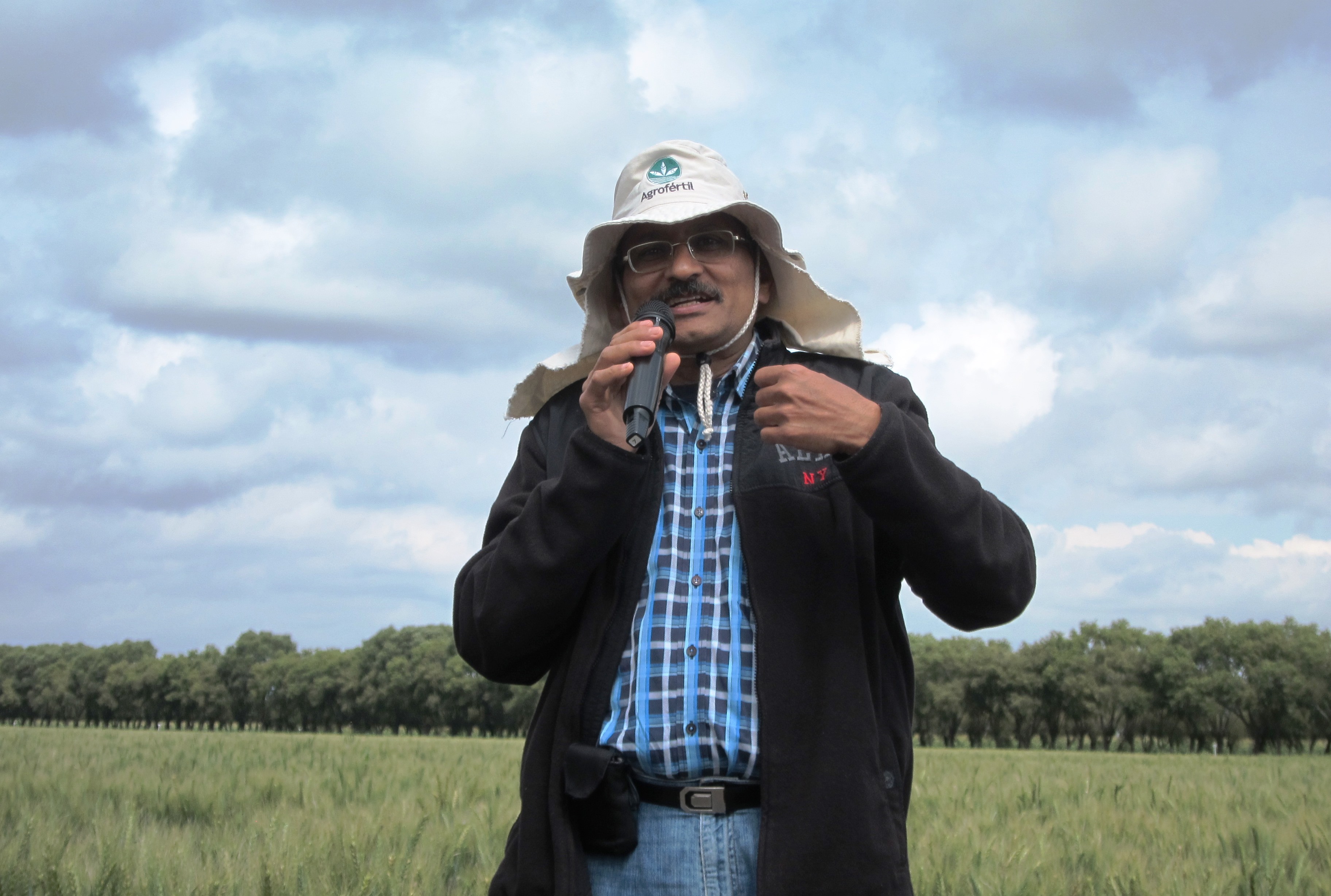
EL BATAN, Mexico (CIMMYT) – Scientist Ravi Singh has been named a Fellow of the American Association for the Advancement of Science (AAAS) this week for his “distinguished contributions to the field of agricultural research and development, particularly in wheat genetics, pathology and breeding.”
Singh, who leads wheat improvement and rust resistance research at the International Center for Maize and Wheat Improvement (CIMMYT), is among 347 members awarded the honor this year by the scientific organization AAAS, which also publishes the journal “Science.”
The fellows were honored due to their scientifically or socially distinguished efforts to advance science or its applications.
During more than 30 years at CIMMYT, Singh has made significant contributions to enhancing food security throughout the developing world. His work has led to the application of durable resistance to control fungal wheat rust diseases, which result in almost $3 billion in crop losses a year. As a result of this work, many farmers do not need to protect their crops with costly fungicides, boosting the potential for organic farming.
Singh’s research has shown that globally effective, durable resistance to leaf, yellow and stem rust fungi in wheat involves interactions of slow rusting genes that have additive effects and that the accumulation of four or five of these genes results in a level of resistance comparable to immunity.
His research group has identified 11 diverse slow rusting genes and discovered that some slow rusting genes confer partial resistance to multiple diseases. These include genes Lr34/Yr18/Sr57/Pm38, Lr46/Yr29/Sr58/Pm39, Lr67/Yr46/Sr55/Pm46 for leaf, yellow and stem rusts, and powdery mildew, respectively.
Singh was a co-investigator for research that led to the cloning of pleiotropic geneLr34, a landmark in understanding the genetic mechanism for slow rusting resistance that is conferred by a unique gene belonging to ABC (ATP Binding Cassette) transporter of PDR (Pleiotropic Drug Resistance) subfamily.
His research team have identified and designated 25 genes in wheat, including: Sr8b, Sr55, Sr57 and Sr58 for stem rust resistance; Lr31, Lr46, Lr61, Lr68 and Lr72 for leaf rust resistance; Yr18, Yr27, Yr28, Yr29, Yr30, Yr31, Yr46, Yr54 and Yr60 for yellow rust resistance; Pm39 and Pm46 for powdery mildew resistance; Bdv1 for barley yellow dwarf virus tolerance; SuLr23 for suppression of leaf rust resistance; Sb1 for spot blotch resistance; and Ltn1, Ltn2 and Ltn3 for leaf tip necrosis.
More recently, his research group identified various Quantitative Trait Loci that confer slow rusting resistance to stem rust including the highly virulent Ug99 stem rust race-group.
Singh was also part of the global research team that isolated the wheat gene Lr67, revealing how it hampers fungal pathogen growth through a novel mechanism. CIMMYT scientists created and field tested genetic mutations of Lr67, to pinpoint the gene’s exact location in the wheat genome.
CIMMYT-derived wheat cultivars with durable rust resistance cover more than 25 million hectares in the developing world, contributing billions of dollars through enhanced yield potential and yield savings in epidemic years.
Singh’s research team has also developed various widely grown current wheat varieties in various countries with enhanced grain yield potential of five to 15 percent combined with heat and drought tolerance and good processing quality.
More recently, the team also initiated breeding wheat with enhanced levels of grain zinc and iron concentration in grain, which are being tested in India and Pakistan to improve the nutrition of women and children with chronic micronutrient deficiency.
Singh has penned 200 peer reviewed journal articles, 26 book chapters/extension publications, 80 published symposia, and 212 symposia abstracts that he has authored and co-authored.
He has also received the “Outstanding CGIAR Scientist Award,” the 2015 China Friendship Award, and awards from China’s provincial governments in Sichuan, Yunnan and Xinjiang. He is a fellow of the American Society of Agronomy, Crop Science Society of America, American Phytopathological Society and the National Academy of Agricultural Sciences of India.
Singh and the other new AAAS fellows will be presented with an official certificate and a gold and blue rosette pin in February during the organization’s 2016 annual meeting in Washington, D.C.
 Innovations
Innovations 
